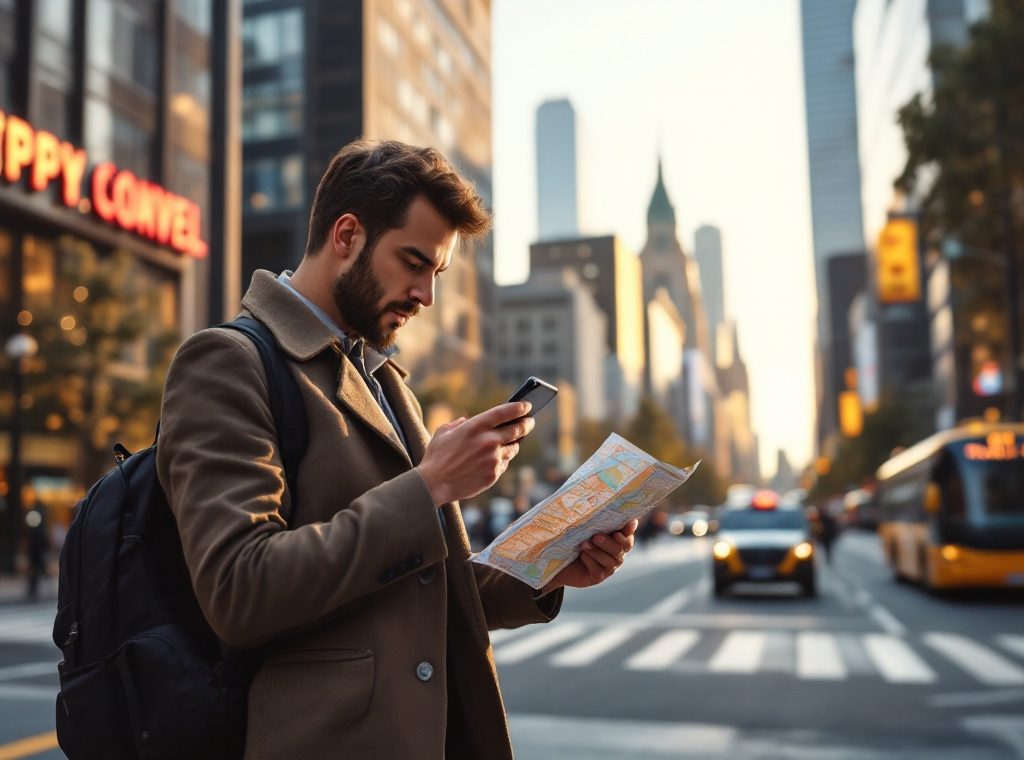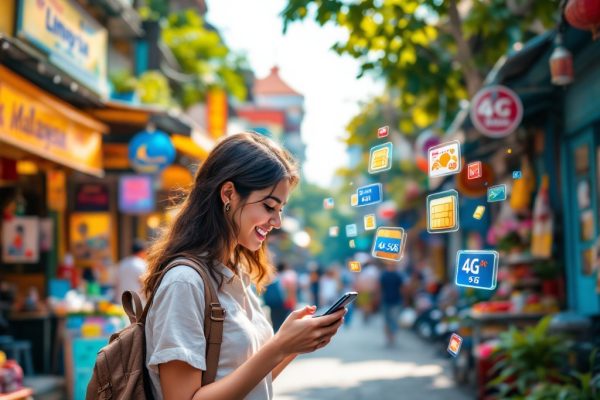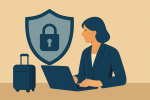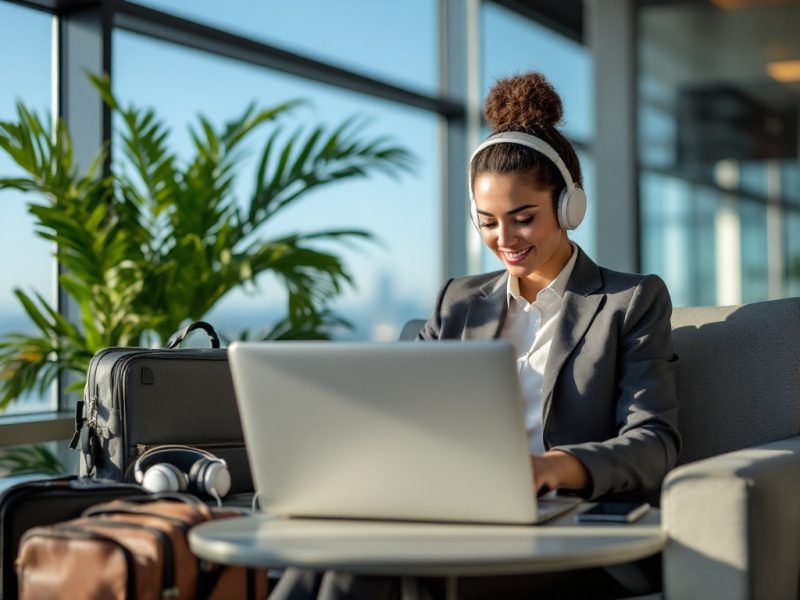Travel Safety Tips for Business Travelers in Unfamiliar Destinations
Traveling for business? Ensure your safety and peace of mind by preparing effectively. This guide offers essential tips, from researching visa requirements and local laws to securing your digital information and understanding local customs. Learn how to choose safe transportation, protect your belongings, and manage risks, allowing you to focus on your business objectives while staying safe abroad. Explore our comprehensive guide to travel safety for business travelers today.
Important information
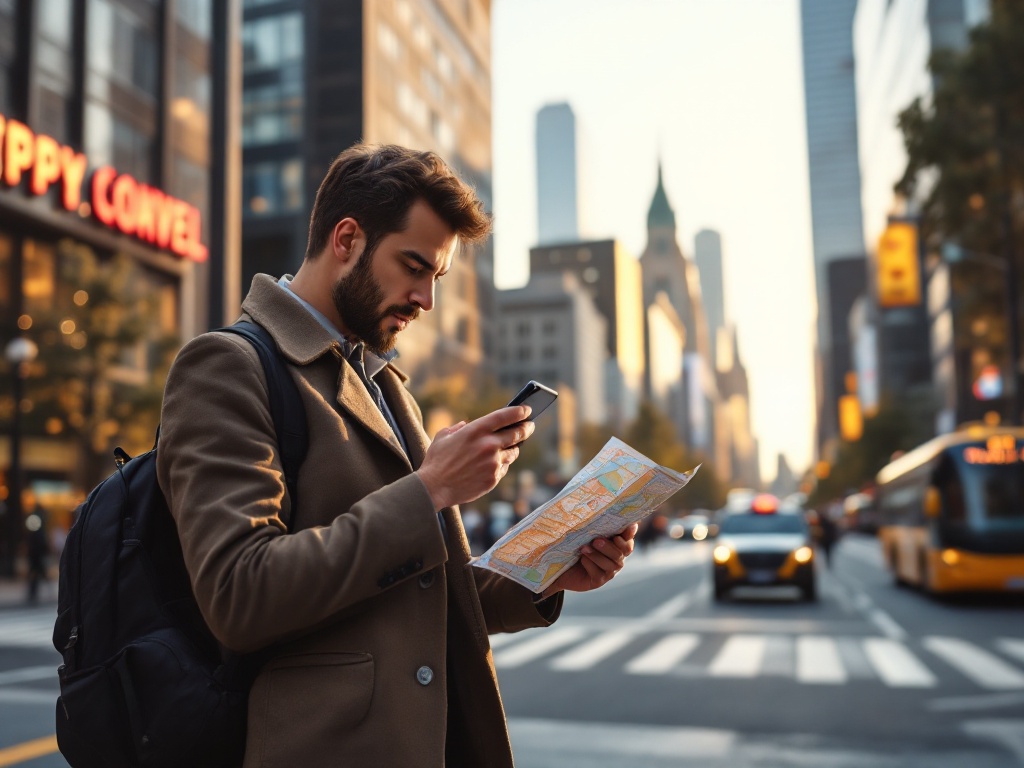
- Research your destination: Learn about local laws, customs, safety concerns, visa requirements, and necessary vaccinations.
- Share your itinerary: Provide a detailed itinerary with emergency contacts to a trusted friend or family member, and enroll in the Smart Traveler Enrollment Program (STEP).
- Secure your documents: Make copies of essential documents like your passport and credit cards, storing them separately from originals, both physically and digitally.
- Prioritize safe transportation and accommodations: Use reputable providers, verify driver details, and research hotel safety features. Avoid unmarked taxis and hitchhiking.
- Practice digital safety: Use a VPN on public Wi-Fi, avoid sharing sensitive information online, and be mindful of social media privacy.
Essential Travel Safety Tips for Business Travelers
Planning your business trip effectively involves several key steps. First, research your destination thoroughly, familiarizing yourself with local laws, safety concerns, and any travel or health restrictions. Ensure you comply with all regulations and understand local customs to avoid unintentional offenses. Second, address visa requirements and get recommended vaccinations. Researching cultural norms and etiquette and learning basic local phrases will significantly improve communication. Third, stay informed about travel advisories and safety warnings issued by your government. Be aware of any health risks or disease outbreaks in the region. Being prepared will contribute to your safety throughout your trip.
Research Your Destination
Before embarking on your journey, take the following steps to ensure a smooth and enjoyable travel experience:
Research visa requirements, safety conditions, and local laws. This will help you avoid any legal issues or safety concerns during your trip.
Consider your health needs. Research the healthcare system at your destination and pack any necessary medications or first-aid supplies.
Learn about areas to avoid. Identify any potentially unsafe neighborhoods or regions and plan your itinerary accordingly.
Familiarize yourself with your hotel’s surroundings. Explore the area using online maps and resources to get a sense of nearby amenities and points of interest.
Plan transportation in advance. Research public transport options, taxi services, or car rentals to ensure seamless travel within your destination.
Understand local customs and cultural nuances. This will enhance your travel experience and show respect for the local culture. Consider cultural training or enrolling in a traveler safety program.
Understand Local Customs and Norms
Researching local customs at your destination before traveling is essential. Dress codes and social interactions vary significantly across cultures, some prioritizing modest attire. Business etiquette also differs. Understanding these nuances not only prevents unintentional offenses but also fosters genuine connections with locals, leading to richer, more positive travel experiences.
Check Travel and Health Restrictions
Before your trip, consult official government websites for visa requirements, travel advisories, and any entry restrictions.
Research recommended vaccinations and necessary health documents.
Familiarize yourself with quarantine protocols and COVID-19 guidelines, both at your destination and upon your return.
Verify any restrictions on medications or other regulated items.
Pre-Trip Planning for Safe Business Travel
Detail your itinerary, including transportation, accommodation specifics, and emergency contacts.
Secure travel insurance to safeguard against unforeseen medical expenses or trip disruptions.
Photocopy your passport and visa and store these copies separately from the originals.
Share your itinerary with a trusted friend or family member, keeping them informed of your whereabouts.
Enroll in the Smart Traveler Enrollment Program (STEP) for updates and assistance.
Book transportation and accommodations in advance, prioritizing safe and reputable providers.
Create a Detailed Safety Plan
Craft a detailed itinerary, including contact information for your accommodations, transport, and emergency services. This ensures a smooth journey.
Digitize essential documents like your passport and itinerary, storing them securely in cloud storage or on your phone. Share these with a trusted contact back home.
Schedule regular check-ins with family or your workplace to keep someone informed of your location.
Consider Travel Insurance
Travel insurance protects your trip and your finances by covering unforeseen problems. These can range from trip cancellations and medical emergencies abroad to lost luggage and medical evacuations. You also gain access to valuable assistance services. This protection is especially crucial for business travelers.
Prepare Important Documents and Copies
Copy essential documents like your passport and credit cards. Create both physical and digital backups to simplify replacements if needed.
Store physical copies in a secure, hidden spot separate from the originals.
Save digital copies on a password-protected website or cloud storage for added security.
Leave copies with a trusted friend or relative for another layer of backup.
Inform a Trusted Contact of Travel Plans
Before embarking on your trip, share your itinerary with a trusted contact. This should include flight information, hotel reservations, and planned activities. Also provide personal and work emergency contact details. This allows someone to monitor your travels and quickly notify the appropriate people if you become unreachable. Sharing your itinerary helps ensure your safety and provides peace of mind for you and your loved ones.
Enlist in the Smart Traveler Enrollment Program (STEP)
Planning a trip or residing overseas? The Smart Traveler Enrollment Program (STEP), a free service provided by the U.S. government, is designed to assist you. By enrolling with the nearest U.S. embassy or consulate, American citizens can register their international travels and receive vital safety updates about their destination directly from embassy officials. Moreover, STEP simplifies communication channels, allowing the embassy to reach you quickly in critical situations, such as natural disasters or civil unrest. Enroll today and stay informed while abroad.
Arrange Transportation and Accommodations
Pre-book your transportation with a reputable provider to ensure a smooth trip.
Thoroughly research your accommodations, prioritizing safety and security measures.
Arrange airport transfers in advance.
Investigate the safety record of local public transit options.
Above all, don’t compromise on your personal safety.
Hotel and Lodging Safety Strategies
Before making a hotel reservation, research its ratings and prioritize safety features such as robust locks, ample lighting, and surveillance systems.
Upon arrival, inspect your room thoroughly, paying close attention to the locks, peephole, and emergency exits.
Familiarize yourself with the hotel’s security protocols to further enhance your safety during your stay.
Research Hotel Ratings and Safety Features
When selecting a hotel, prioritize reputable establishments with robust security measures. Look for features like comprehensive surveillance systems, keycard access, and on-site security personnel. These precautions significantly enhance your safety and peace of mind.
- Choose reputable hotels with strong security measures, such as surveillance systems, keycard access, and security personnel.
- Prioritize your safety and peace of mind during your stay.
- Look for security features that deter unauthorized access and ensure a safe environment.
Check-in Safety and Room Security Features
Upon arrival, inquire about the hotel’s safe check-in procedures.
Request a room located away from stairwells and exits for enhanced security.
Inspect your room door, ensuring it has a sturdy deadbolt, strong locks, and a peephole.
Verify that the windows have secure latches.
For the safety of your valuables, utilize the hotel safe.
Personal Safety Tips While Traveling
Be aware of your surroundings and try to blend in.
Travel with companions, especially at night.
Plan activities for daylight hours.
Keep a close eye on your belongings and use luggage locks.
Protect your drinks by never accepting them from strangers.
Stay Aware of Surroundings and Blend In
To minimize standing out as a tourist, dress down and avoid displaying expensive items like jewelry or cash. Mimic the local style to blend in seamlessly. Discreetly consult maps and guidebooks, ensuring you appear confident and familiar with your surroundings.
Familiarizing yourself with local customs can prevent unintentional offense. This includes dressing appropriately for religious sites and learning basic greetings in the local language. While fluency isn’t expected, demonstrating respect for local traditions is key to a positive travel experience.
Travel in Groups and Embrace Daylight
For a safer experience, explore with colleagues or trusted locals. Avoid going out alone at night, especially in unfamiliar areas.
Keep an Eye on Belongings and Use Luggage Locks
Keep your belongings within your sight at all times. Secure your luggage with TSA-approved locks for added security.
Watch Your Drinks and Practice Drink Safety
Protect your drink by keeping a close eye on it.
Refrain from accepting drinks from strangers.
If you experience any discomfort after consuming a drink, seek immediate help.
Opt for public places rather than private settings when meeting new people.
Be aware of your alcohol intake.
Report any suspicious behavior to the authorities.
Ground Transportation and Driving Safety
Prioritize safe transportation options when traveling. Consider these recommendations:
Choose reputable transportation services. Opt for registered taxi services or reliable public transit options.
Explore ride-sharing and pre-booked car services. These are excellent alternatives, especially if taxis are limited, ensuring vetted drivers for your safety.
Research transportation options in advance. Before your trip, thoroughly research the safety and reliability of public transportation at your destination.
Understand local driving regulations if renting a car. Familiarize yourself with local traffic laws and road conditions to ensure a safe driving experience.
Park in safe locations. When parking or waiting, choose well-lit and populated areas for increased security.
Use Reputable Registered Taxis
Ensure safe journeys by using only officially registered taxis. Pre-booking is recommended, or you can find them at designated taxi ranks at major airports like Heathrow, Gatwick, and JFK. If hailing a cab, always confirm the driver’s identification and licensing. Avoid unmarked vehicles and never enter an unofficial car for your safety.
Use officially registered taxis for safe journeys.
Pre-book your taxi or find one at designated taxi ranks at major airports like Heathrow, Gatwick, and JFK.
Confirm the driver’s identification and licensing if hailing a cab.
Avoid unmarked vehicles and never enter an unofficial car for your safety.
Evaluate Transportation Options and Public Transport Safety
Prioritize safety when using public transport by checking its safety record and any local advisories. For airport transfers, arranging service through your hotel or a reputable provider is recommended. When using ride-hailing apps, verify the driver’s details match the information provided in the app. Avoid unregistered taxis and never hitchhike.
Check the safety record and local advisories for public transport. This will help you make informed decisions about which modes of transport are safest.
Arrange airport transfers through your hotel or a reputable provider. This is a safer and more reliable option than taking an unregistered taxi or hitchhiking.
When using ride-hailing apps, verify the driver’s details match the app’s information. This helps ensure you are getting into the correct vehicle with the right driver.
Avoid unregistered taxis. These can be unsafe and may not be regulated.
Never hitchhike. This is a risky practice that can put you in danger.
Health and Wellbeing Considerations
Stay healthy on your trip by taking precautions with food and water. Always choose bottled water and avoid tap water. In restaurants, observe food handling practices to ensure they meet hygiene standards. Refrigerate perishables quickly to maintain freshness.While street food can be tempting, it carries a higher risk of foodborne illness. Use caution when deciding whether to indulge. Consult your doctor about recommended vaccinations and preventative medications before your trip. Researching potential health concerns at your destination is also crucial for a healthy journey.
Be Aware of Food and Water Safety
To avoid food poisoning, opt for bottled water instead of tap water.
Be cautious with salads and raw foods, as they can harbor harmful bacteria if not thoroughly washed.
Stick to cooked food, ensuring it’s well-prepared.
Avoid Street Food and Understand Health Threats
While the allure of street food is tempting, be aware of potential health risks. Unsanitary conditions and questionable ingredients can cause traveler’s diarrhea and more serious foodborne illnesses. Before traveling, research safe food and water practices. Also, check travel advisories or food import/export restrictions. Being informed helps you enjoy your trip safely. Here’s a helpful checklist:
- Research safe food and water practices for your destination.
- Check for travel advisories and food restrictions.
- Be cautious of street food vendors with questionable hygiene.
Emergency Preparedness and Risk Management
research common local crimes and take necessary precautions.
Identify the locations of nearby medical facilities, such as clinics or hospitals, in case of any medical emergencies.
prepare a list of important contacts, including local authorities, your embassy or consulate, and personal emergency contacts.
Check Common Crimes and Safety Precautions
Research common crimes at your destination, such as theft, scams, and assault.
Secure your valuables using your hotel room safe and all available locks.
Exercise caution when opening your hotel door, always verifying the identity of anyone knocking.
Familiarize yourself with the hotel layout, including fire exits and elevators.
Be discreet about your room number, avoiding mentioning it in public areas.
Consult the hotel staff for advice on safe practices and areas to avoid.
Locate Nearby Medical Clinics
Locate nearby medical facilities, such as clinics or hospitals, using online search engines and local directories. Your hotel can also provide assistance. If you have pre-existing conditions, confirm that the clinic can address your specific needs. Remember to bring essential medical information, including a list of allergies and current medications.
Use online search engines and local directories to find nearby medical facilities like clinics or hospitals.
Inquire at your hotel for recommendations on nearby medical facilities.
If you have pre-existing conditions, ensure the clinic can address your specific needs.
Bring essential medical information, including a list of allergies and current medications.
Keep Emergency Contact Information Handy
Keep essential contact information readily available. Save these details in your phone and write them down in a notebook as a backup. Include your hotel’s name, address, and phone number, as well as your company’s emergency contact information and your local embassy’s details. Also, add local emergency numbers to be fully prepared for any situation.
Save key contacts in your phone for easy access.
Write down essential contacts in a notebook as a backup.
Include your hotel’s name, address, and phone number.
Save your company’s emergency contact information.
Note down your local embassy’s details for crisis situations.
Add local emergency numbers for comprehensive preparedness.
Cybersecurity and Digital Safety for Business Travelers
Public Wi-Fi often lacks robust security, making it risky. A VPN is a good solution because it encrypts your connection, shielding your data.
- Be mindful of what you share on social media while traveling, limiting sensitive details.
- Enable two-factor authentication on all accounts.
- Use strong, unique passwords for each account.
- Regularly back up your important data to a secure cloud service or external device.
Secure Public Wi-Fi and Use a VPN
Using public Wi-Fi networks can be risky, but a VPN offers a good way to enhance your security. It encrypts your data, shielding your online activity from prying eyes. Even with a VPN, exercise caution and avoid accessing sensitive information like bank accounts or business emails on these often unsecured networks. Also, remember to use strong passwords for added protection. Here’s how to stay safe on public Wi-Fi:
Use a VPN: a VPN encrypts your internet traffic, making it much harder for hackers to intercept your data. This is especially important when using public Wi-Fi, which is often unsecured.
Be cautious about the websites you visit: avoid accessing sensitive information like bank accounts or business emails on public Wi-Fi, even with a VPN. These networks are often unsecured, and hackers could potentially intercept your data.
Use strong passwords: choose strong, unique passwords for all of your online accounts. This will help to protect your accounts even if a hacker does manage to intercept your data.
Look for HTTPS: ensure that websites you visit use HTTPS. The “s” indicates a secure connection, encrypting data transmitted between your browser and the website.
Enable your firewall: firewalls act as a barrier between your device and the internet, blocking unauthorized connections. Ensure your device’s firewall is enabled for added security.
Protect Social Media Privacy and Digital Information
Protect your privacy and security on your next trip by being discreet with your social media activity. Avoid posting real-time location updates, detailed itineraries, or your hotel information, including your room number. Instead, wait until you return home to share those stunning vacation photos and exciting travel stories. Consider these helpful tips for safe social media practices while traveling:
- Disable geotagging on your photos and social media posts to prevent revealing your exact location.
- Refrain from posting real-time updates about your current whereabouts. Instead, share your travel experiences after you’ve left a location.
- Avoid sharing detailed travel plans or itineraries publicly. Keep this information private to minimize security risks.
- Do not disclose your hotel information, especially your room number, on social media platforms.
- Be mindful of the information visible in the background of your photos and videos. Avoid inadvertently revealing sensitive information like addresses or landmarks that could compromise your security.

